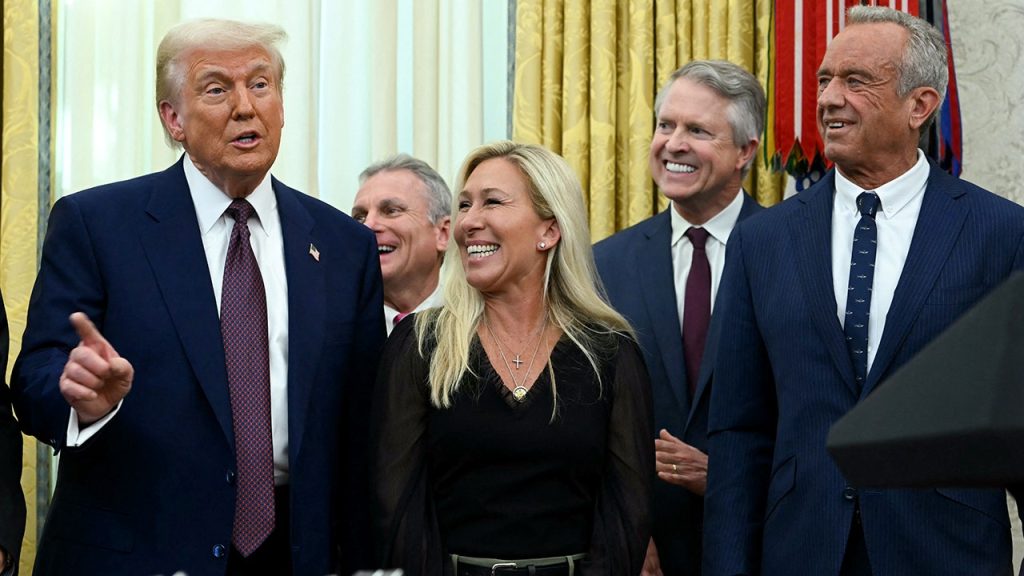Trump vs. Greene: The Unraveling of a Political Alliance
In a dramatic turn of events that has captured the attention of the political world, former President Donald Trump and Representative Marjorie Taylor Greene’s once-strong alliance has spectacularly collapsed, culminating in Greene’s announcement that she will resign from Congress effective January 5, 2026. The public falling out between these two prominent Republican figures reveals deeper tensions within the party and highlights the personal nature of political relationships in Washington. Trump took to his Truth Social platform on Saturday morning to react to Greene’s resignation announcement, referring to her as “Marjorie ‘Traitor’ Brown” and suggesting she quit due to “PLUMMETING Poll Numbers” and to avoid facing a primary challenger with his endorsement. The former president claimed Greene “went BAD” after he “refused to return her never ending barrage of phone calls,” while also criticizing her relationship with Kentucky Representative Thomas Massie, whom Trump described as “the WORST Republican Congressman in decades” and “Rand Paul Jr. because he votes against the Republican Party.” Despite the harsh words, Trump concluded his statement by expressing appreciation for Greene and thanking her for her service to the country, a seemingly contradictory sentiment that has become characteristic of his public communications.
Greene’s resignation announcement came just one week after Trump publicly withdrew his endorsement of the Georgia lawmaker, whom he had previously called “wacky” and “a ranting lunatic.” In her lengthy statement posted to X (formerly Twitter), Greene did not directly attack Trump but acknowledged that his recent public break was “hurtful.” She framed her decision to leave Congress within a broader critique of what she termed the “Political Industrial Complex” in Washington, which she described as corrupt and using Americans as “pawns in an endless game of division.” Greene, who had been one of Trump’s most vocal defenders throughout his presidency and beyond, struck a philosophical tone about her departure: “My heart remains filled with joy, my life is filled with happiness, and my true convictions remain unchanged because my self worth is not defined by a man, but instead by God who created everything in existence.”
The public deterioration of this political relationship offers a fascinating glimpse into the personal dynamics that often underpin political alliances in Washington. Greene, who rose to prominence as a firebrand representative closely aligned with Trump’s agenda and rhetoric, now finds herself on the receiving end of his public ire. The specific triggers for Trump’s change of heart remain somewhat murky, though his mention of unreturned phone calls suggests personal grievances may have played a significant role. This pattern of former allies becoming targets of Trump’s criticism is not new – numerous former cabinet members, advisors, and political supporters have experienced similar falls from grace after perceived disloyalty or disagreements with the former president. What makes this case particularly noteworthy is Greene’s status as one of Trump’s most steadfast congressional supporters, someone who has consistently echoed his claims about the 2020 election and defended him through both impeachments.
The timing and nature of Greene’s resignation announcement are also significant. By stating her intention to serve until January 2026, she is effectively announcing she won’t seek reelection rather than immediately vacating her seat. This approach allows her to complete her current term while avoiding a potentially difficult primary campaign without Trump’s backing. Her resignation statement highlighted disillusionment with both political parties, claiming they use Americans “election cycle after election cycle, in order to elect whichever side can convince Americans to hate the other side more.” She added that “the results are always the same — nothing ever gets better for the common American man or woman,” reflecting a populist criticism of Washington that ironically aligns with much of Trump’s own rhetoric about draining the swamp.
This political breakup takes place against the backdrop of broader Republican Party dynamics, where loyalty to Trump remains a significant factor in primary contests and overall political standing. Trump’s willingness to withdraw support from Greene, despite her consistent loyalty until recently, sends a message to other Republican officials about the conditional nature of his endorsement. It also raises questions about the direction of the party’s more populist wing, which has often looked to both Trump and figures like Greene as standard-bearers. Greene’s congressional district in Georgia, rated as “Solid R” by the Cook Political Report, will likely remain in Republican hands regardless of this drama, but the identity and positioning of her eventual replacement may provide further insight into the evolving nature of the party’s base and its relationship with Trumpism.
The dramatic public spat between Trump and Greene represents more than just a personal disagreement between two political figures; it symbolizes the volatile nature of political alliances in the current era and the outsized role that personal relationships and loyalty tests play in determining political fortunes. As Greene prepares to return to what she described as “the people I love,” and Trump continues to exercise his considerable influence over Republican politics, this episode will likely be remembered as a significant moment in the ongoing evolution of the Republican Party and its relationship with its most recent president. The contradictions inherent in both figures’ statements – Trump’s simultaneous criticism and appreciation of Greene, and Greene’s hurt feelings alongside her assertion that her self-worth is not defined by any man – mirror the complicated and often contradictory nature of contemporary American politics itself.


